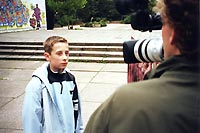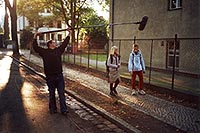|
Interview with Director Michael Gautsch!

How did you come up with the idea for “The Little School of Behaviour”?
A teacher rang the educational film distribution office of Cinetop-Film and asked if there was a film concerning “good behaviour” available for schools. We looked for something matching this criteria but came up with nothing. In the end I said: “If such a film doesn't exist, then let's make one”.
Was this a difficult undertaking?
Sometimes. I thought for a long time about how to address such a topic. A film that simply strings together acts of good behaviour, like an etiquette guide, seemed to me to be too one-dimensional and didn't offer me a solid ground to properly identify with children. People, children included, often take the easiest path. Therefore, it was important to show the negative portrayal first, where egoism and recklessness lead to failure and then the positive version that leads to success. To me, the comparison of good and bad behaviour seemed, in a didactic sense, to be more sensible.
Did you receive any advice from experts?
We gave teachers who teach students at this level, individual copies of the script to read. This included some teachers who also provide behavioural education in some of their lessons. We received a lot of feedback from this and made every effort to integrate their valuable suggestions into the screenplay. Sometimes we did indeed have to reach a compromise because the teachers offering us advice sometimes had differing views.
Can you give an example?
For example, in the scene where Max is late for class and makes up an excuse about his cat and then his hamster, which the teacher then calls his “hamster-cat” and the whole class laughs. One teacher thought this scene should remain exactly as it is because it gives the film a more relaxed feel. However, another teacher was of the opinion that Max's behaviour here is not exemplary. We then expanded the scene to show Max admitting that he was late because he had met a friend outside school. He owns up, learns not to make up excuses but to tell the truth. To show this scene, of course, makes sense.
How important was the film dialogue to you?
Unbelievably important. And as an author, you can never be sure if you've got it right. In such cases, you just have to take the bull by the horns. In order to be really sure that the dialogue was realistic and representative of the correct age group we carried out a script read-through in one of the classes in which we filmed.
And were there any corrections?
Well, yes. The students usually said things like “I'd say that like this ...” rather than “No one says that”. Some new ideas were also introduced. Like the excuse, that they hadn't heard the school bell ring. The teacher who was present at the time of the script read-through said afterwards that she was surprised at how openly the children expressed themselves.
How did the children react to the sentences with which Max is abusive to the elderly lady on the bus?
Not at all. These weren't in the script. The children thought these up themselves. I didn't feel comfortable writing such things on paper. But they bring a high level of authenticity to the scene. In this scene, the elderly woman on the bus ignores Max's verbal attack. She only reacts after the children do not offer their seats to a heavily pregnant woman. I recognise a certain perplexity from adults, who are not sure how to adequately deal with such situations. During the filming of this scene on the bus and on the street I was repeatedly approached by elderly citizens who complained about the behaviour of children on their way to school. I think it is extremely important that such matters are brought to attention in the classroom.
For some years there has been a discussion in Germany debating whether a social education class should be introduced.
Certainly only in very few cases would it be necessary to make such a class either optional or compulsory. There are however, a considerable number of teachers who teach aspects of social behaviour in other subjects, such as for example vocational studies.
Should such a class be established?
I think that would be excessive. I do not doubt the need for a focus to be placed on correct behaviour during lessons. In fact, the complete opposite. I think it makes a lot of sense to teach correct behaviour across a range of subjects.
Even though the responsibility for ensuring good behaviour in children should fall on the parents?
Yes, for different reasons a part of parenthood has more or less detached itself from the raising of children. Teachers have to – often unwillingly – take on the task of bringing up the children. During the research for this film I noticed for example that some children have never learnt to check if there are people behind them when opening a door in a public place. Some children would see letting the door slam in a teachers face as completely normal. When such acts become common practice, we have to do something about it. Anyone who says social behaviour classes are completely superfluous, is denying reality.
Were the children well disciplined during filming?
The filming was remarkably unproblematic. The three schools in which we filmed, supported us to the best of their ability. The actors, especially the children actors played their roles well.
How many children did you have to cast, in order to fill the main roles of Max and Julia?

Originally, we thought we would have to cast thirty to fifty children but we were lucky and we only had to audition nine. Casting is very time-consuming and it is often the parents who are more excited than the children. Whilst the talent of the actress playing Julia already shone through at the screen test, it wasn't until the actual filming that Philip's talent, the actor playing Max, started to shine.
Are you happy with the end result?
The script was influenced by many content requirements, which is always the case with an educational film. With the help of a very good ensemble of actors we were successful in personalising the story and making it colourful and lively. The first reactions to the film have shown that it does indeed possess a certain entertainment value.

|